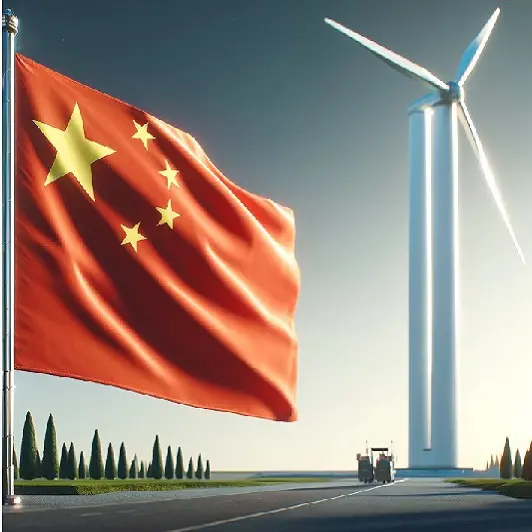New research from the International Energy Agency (IEA) has revealed that even though Europe may outspend the US on clean energy this year, China’s clean energy spending plans will massively surpass that of Europe and the US combined.
China In First Place
The ‘World Energy Investment 2024’ report from the IEA, which tracks capital flows in the energy sector, shows that clean energy investments are set to be up by more than 50 per cent from 2020.
The report shows that whereas Europe is expected to be spending an estimated $370 billion on clean energy, while the United States spends $315 billion (about $970 per person), China is expected to lead in clean energy investment this year with approximately $675 billion (about $2,100 per person) – nearly twice as much as the combined investments of Europe and the US!
Investment In What And Why?
The report shows that the focus of China’s investment is primarily on solar photovoltaic (PV) technology, driven by falling module prices and strong domestic manufacturing capabilities. Solar PV investments alone are projected to exceed $500 billion globally, with China contributing a substantial portion.
Also, China’s investments are being bolstered by rapid growth in three new clean energy industries – solar cells, lithium battery production, and EV manufacturing.
Why Are Europe and The US Not Investing As Much?
The lag in clean energy investment by Europe and the United States compared to China highlighted by the report, can be attributed to factors such as:
– Scale and speed. China’s aggressive scaling and rapid deployment of renewable technologies outpace Europe and the US. However, this is partly down to China benefitting from substantial state funding and low manufacturing costs, enabling quicker and more extensive deployment of solar PV and other technologies.
– China’s manufacturing dominance. China’s dominance in manufacturing solar panels, batteries, and EVs at lower costs due to economies of scale and cheaper labour allows it to invest more heavily in these areas. This competitive edge in production costs gives China a significant advantage over the US and Europe.
– Government policies. Chinese government policies provide strong incentives and subsidies for clean energy projects, fostering growth in the sector. In contrast, the US and Europe have more fragmented policies, with varying levels of support across states and countries, which slows investment.
– The cost of capital. Higher financing costs in Europe and the US hinder clean energy investments. In China, favourable financing terms from state-owned banks lower the cost of capital, encouraging more investment.
– Infrastructure challenges. Europe and the US face significant challenges in upgrading their grid infrastructure and energy storage systems to support renewable energy. China, however, appears to have been more proactive in modernising its grid infrastructure, facilitating the integration of renewable energy sources.
– Strategic policy. China’s industrial policy focuses heavily on becoming a global leader in clean energy, emphasising both domestic production and export dominance. Europe and the US are still developing comprehensive strategies to match China’s aggressive approach.
– The different regulatory environments. Stricter environmental regulations and longer approval times for new projects in Europe and the US can delay investment and project implementation. In China, regulatory processes are often more streamlined, allowing for faster progress.
Isn’t China The Biggest Greenhouse Gas Producing Country?
In short, yes. China is the largest emitter of greenhouse gases in the world. For example, in 2021, China accounted for about 27 per cent of global carbon dioxide emissions, making it the single largest contributor to climate change. This is largely due to China’s heavy reliance on coal for energy and its rapid industrialisation and urbanisation over the past few decades. However, as highlighted by the ‘World Energy Investment 2024’ report, there now appears to be a strong commitment by China to transitioning towards cleaner energy sources. Its clean energy investments will be crucial for reducing its carbon footprint and addressing the global climate crisis.
Global Disparity
The ‘World Energy Investment 2024’ report highlights not just the fact that China’s clean energy investment will far outstrip that of that of the US and Europe this year, but also that there is an uneven distribution of clean energy investments globally. For example, other regions, particularly developing economies, struggle to keep pace. Clean energy investment in emerging and developing economies remains low, accounting for only about 15 per cent of global spending. High financing costs and lack of supportive policies are major barriers in these regions.
Fossil Fuel Investment Still Strong
Another key point outlined in the report, however, is that investment in fossil fuels remains strong, with upstream oil and gas investments projected to increase by 7 per cent in 2024 to $570 billion, following a 9 per cent rise in 2023. Coal investments have also been rising, with more than 50 GW of unabated coal-fired power generation approved in 2023 (predominantly in China). Despite this, clean energy investments are growing faster – for every dollar invested in fossil fuels, nearly two dollars are now directed towards clean energy technologies.
What Does This Mean For Your Organisation?
The disparity in clean energy investment revealed by the IEA’s ‘World Energy Investment 2024’ report carries significant implications for businesses in the UK and across Europe. For new clean energy industries, the rapid advancement and substantial investment seen in China underscores the urgency for Europe and the UK to bolster their efforts. The heavy investment in solar PV, lithium batteries, and EV manufacturing in China sets a high benchmark, illustrating the benefits of aggressive state support and strategic industrial policies.
For UK businesses, this disparity presents both a challenge and an opportunity. The challenge lies in competing with China’s scale and speed of deployment. However, this also opens opportunities for innovation and collaboration in clean energy technologies. UK companies can leverage their expertise in renewable energy and look to form partnerships that tap into global supply chains. Also, businesses can advocate for more robust government policies that provide clear incentives and reduce financing costs, making clean energy projects more viable.
To increase investment in clean energy, Europe and the UK must address several key areas. First, there is a need for comprehensive and cohesive policies that provide consistent support across all regions. This includes streamlining regulatory processes to reduce approval times for new projects and ensuring that environmental regulations are balanced with the need for swift project implementation. Also, improving access to affordable capital through state-backed financial incentives or low-interest loans could help make a significant difference.
Enhancing infrastructure is another critical area. Upgrading grid infrastructure and expanding energy storage capabilities are essential to support the integration of renewable energy sources. Investments in these areas not only facilitate the transition to clean energy but also create new business opportunities in infrastructure development and maintenance.
Strategic industrial policies that focus on building domestic capabilities while engaging in international cooperation may also help to position Europe and the UK as leaders in the global clean energy market. By fostering innovation and supporting emerging technologies, the UK could develop a competitive edge and create sustainable economic growth.
Addressing these challenges, therefore, through targeted investments and supportive policies will not only help the UK and Europe catch up with China’s clean energy spending but also drive long-term benefits for businesses. Increased clean energy investment will enhance energy security, create jobs, and help position the UK as a key player in the global transition to sustainable energy.


